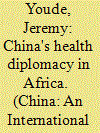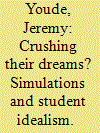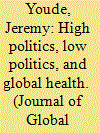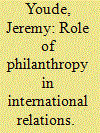| Srl | Item |
| 1 |
ID:
184762


|
|
|
| 2 |
ID:
109873


|
|
|
|
|
| Publication |
2012.
|
| Summary/Abstract |
The International Health Regulations (2005) gave the World Health Organization a central role in collecting biosurveillance data and explicitly recognized the importance of human rights for the first time. Human rights and biosurveillance have a complicated relationship with one another though. Surveillance systems are necessary in order to arrest the spread of infectious disease outbreaks, but these same surveillance systems can be used in discriminatory ways. Is some sort of resolution or detente possible? This article investigates the role of the World Health Organization in implementing these potentially competing imperatives contained within the International Health Regulations (2005). To understand this relationship, it examines how the World Health Organization would implement the International Health Regulations in case of an international zombie outbreak.
|
|
|
|
|
|
|
|
|
|
|
|
|
|
|
|
| 3 |
ID:
095195


|
|
|
| 4 |
ID:
084677


|
|
|
|
|
| Publication |
2008.
|
| Summary/Abstract |
In-class simulations can offer students an excellent opportunity to apply the lessons they have learned in a practical and fun manner. The literature on active learning in international relations demonstrates the many values simulations possess. In running a simulation on the conflict in Darfur, I identified an additional potential value in in-class simulations: they can be a technique for tempering student idealism. Students often fail to appreciate the disconnect between their personal political convictions and the political realities that impede conflict resolution. Simulations allow students to apply theory to practice in a way that encourages students to temper their idealism by acknowledging political realities on the ground. I discuss how a week-long simulation on Darfur encouraged students to balance idealism and realism and understand why reaching agreements in the international community can be so difficult.
|
|
|
|
|
|
|
|
|
|
|
|
|
|
|
|
| 5 |
ID:
102170


|
|
|
| 6 |
ID:
156236


|
|
|
|
|
| Summary/Abstract |
Over the course of a single generation, the international community has undergone a radical shift in its views on its collective obligation to address health in low- and middle-income countries. This shift toward accepting the need to respond to global health concerns is rhetorical, behavioral, and financial—and has been maintained even in light of the incredible economic issues and austerity policies that have faced high-income states since 2008. What explains this shift in the international community's sense of obligation and the necessity of actuating an effective response? This article argues that the role and prominence of global health governance within international society reflects its emergence as a secondary institution within international society.
|
|
|
|
|
|
|
|
|
|
|
|
|
|
|
|
| 7 |
ID:
145532


|
|
|
|
|
| Summary/Abstract |
It has become commonplace to argue that global health has ascended from “low politics” to the ranks of “high politics” in international relations—those issues of existential importance to the state and which concern its very survival. Despite its ubiquity, the actual substance of such a shift in the framing of global health is largely unexamined. In this article, I argue that empirical evidence belies the idea that global health is a “high politics” issue. This dichotomy makes little sense, and efforts to reframe global health as a “high politics” or securitized issue rarely succeed. While it is undoubtedly true that global health has received significantly greater attention from the international community over the past twenty-five to thirty years, that attention does not spring from global health being reframed as a “high politics” issue for states.
|
|
|
|
|
|
|
|
|
|
|
|
|
|
|
|
| 8 |
ID:
164435


|
|
|
|
|
| Summary/Abstract |
Global philanthropy is a significant source of financial resources in contemporary international relations, and it has provoked intense debates about the appropriateness of involving private foundations in global policymaking. Despite these facts, International Relations as a discipline has shown remarkably little reference to philanthropy as an important and relevant actor in global politics. In this article, I make the case for explicitly incorporating philanthropy into international relations analyses. Drawing on both historical examples and contemporary cases from the global health space, I show how philanthropy exerts a unique and independent influence within international society and that it needs to be understood holistically rather than focusing solely on individual philanthropic organisations. I also discuss how this expanding influence raises serious questions about accountability and legitimacy. Rather than making an argument about the appropriateness of philanthropy’s involvement in international society, this article aims to make the case for philanthropy’s analytical inclusion within the discipline.
|
|
|
|
|
|
|
|
|
|
|
|
|
|
|
|
| 9 |
ID:
122998


|
|
|
|
|
| Publication |
2013.
|
| Summary/Abstract |
Is it better to publish or restrict potentially dangerous dual-use scientific research? This question sparked international attention in mid 2011 when two researchers separately sought to publish scientific studies that demonstrated that laboratory-derived strains of the highly pathogenic avian influenza H5N1 virus became capable of airborne transmission after a few genetic manipulations. These findings raised fears that the virus could become easily transmissible among mammals and that rogue actors could use the published information to create a biological weapon. In response, some governments sought to restrict or prohibit the publication of such research. Other actors countered that sharing this information was the best way to ensure national and international safety and security. In this article, I examine the competing demands between public health and national security by examining two dual-use research controversies. This article shows that the best solution to dual-use dilemmas in security-sensitive biological research is to promote an international norm of dual-use awareness. This balances the value of transparent scientific research with dual-use research's potential implications to provide the highest degree of security. Promoting a global norm, cognizant of potential consequences, would allow for scientific research to continue while ensuring that security considerations play a vital role in conditioning the scientific conversation. Such an effort need not be directed by governments; indeed, professional societies could and should take the lead in promoting such efforts.
|
|
|
|
|
|
|
|
|
|
|
|
|
|
|
|
| 10 |
ID:
163173


|
|
|
|
|
| Summary/Abstract |
Though global health has attained a prominent position on the global political agenda over the course of a generation, the inauguration of the Trump Administration in the United States threatens to challenge this international consensus. He has evinced scepticism about the value of multilateralism, called for significant cuts to foreign aid, and expressed fear that foreigners would bring disease to the United States. In the face of these challenges and the need to at least maintain current levels of international commitment to global health to prevent reverses in health gains, I argue that the securitisation of health may offer a pragmatic strategy for keeping the United States engaged on global health issues.
|
|
|
|
|
|
|
|
|
|
|
|
|
|
|
|
| 11 |
ID:
134269


|
|
|
|
|
| Summary/Abstract |
Romania and South Korea were once among the top sending countries for adoptive American families. In recent years, though, both have adopted significant restrictions on intercountry adoption. What leads countries to introduce such severe restrictions? This article argues that shame plays a significant, yet underappreciated, motivating factor for leading governments to change their laws on intercountry adoption. Political leaders seize on nationalist rhetoric to argue that intercountry adoption is shameful. The article explores the interaction between intercountry adoption and shame through brief case studies on Romania and South Korea. Finally, it examines the role of the Hague Convention on Protection of Children and Cooperation in Respect of Intercountry Adoption (Hague Adoption Convention) in ameliorating these feelings.
|
|
|
|
|
|
|
|
|
|
|
|
|
|
|
|